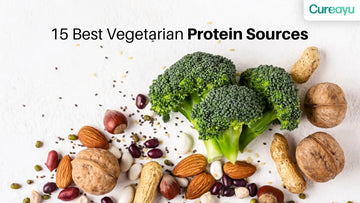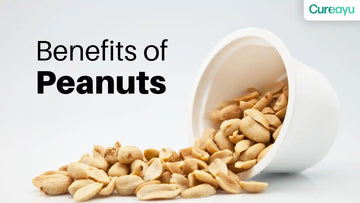Finding quality protein sources is crucial for maintaining a healthy and balanced diet, especially for vegetarians. Protein is an essential macronutrient that supports various bodily functions, including muscle growth, tissue repair, and the production of enzymes and hormones. For vegetarians, obtaining sufficient protein can sometimes be a challenge, as traditional sources like meat and fish are off the table. However, there are numerous vegetarian options that are rich in protein and can easily fit into any diet. This blog will explore 15 of the best vegetarian protein sources to help you meet your nutritional needs.
Also Read: Best Summer Foods To Keep Your Energy High
What Is Protein?
Protein is a macronutrient made up of amino acids, which are the building blocks of our body. There are 20 different amino acids, nine of which are considered essential because our bodies cannot produce them, and they must be obtained through our diet. Proteins play a vital role in almost every biological process, including cell structure, function, and regulation. They are involved in the creation of antibodies, enzymes, and hormones, making them indispensable for maintaining overall health.\
Importance Of Protein
- Muscle Building and Repair: Protein is crucial for the growth and repair of muscles. It provides the necessary amino acids to rebuild muscle fibers that are broken down during exercise, leading to increased muscle mass and strength.
- Enzyme Function: Enzymes are proteins that catalyze biochemical reactions in the body. They are essential for digestion, energy production, and other metabolic processes.
- Immune System Support: Proteins are involved in the production of antibodies, which help the immune system fight off infections and diseases.
- Hormone Regulation: Some hormones, such as insulin and glucagon, are proteins. They play key roles in regulating blood sugar levels and other important bodily functions.
- Satiety and Weight Management: High-protein foods can help you feel fuller for longer, which can aid in weight management by reducing overall calorie intake.
Also Read: Vitamins and Minerals Difference: Understanding Their Unique Roles in Health
What Are Vegan Protein Sources?
Vegan protein sources are plant-based foods that provide essential proteins without the need for animal products. These sources are not only rich in protein but also come with added benefits like fiber, vitamins, and minerals. Incorporating a variety of these foods can ensure that vegetarians get the best plant-based protein options to meet their dietary needs. These sources include legumes, grains, nuts, seeds, and certain vegetables, all of which offer diverse amino acid profiles to support overall health.
15 High Protein Vegan Sources
- Lentils: Lentils are a fantastic source of protein, providing about 18 grams of protein per cooked cup. They are also rich in fiber, iron, and folate, making them a nutritious addition to soups, stews, and salads.
- Chickpeas: Also known as garbanzo beans, chickpeas offer about 15 grams of protein per cooked cup. They can be used in various dishes such as hummus, curries, and salads, and are also high in fiber and essential minerals.
- Quinoa: Quinoa is a complete protein, meaning it contains all nine essential amino acids. It provides around 8 grams of protein per cooked cup and is also a good source of fiber, magnesium, and manganese.
- Tofu: Tofu, made from soybeans, offers approximately 10 grams of protein per half-cup serving. It's versatile and can be used in a variety of dishes, from stir-fries to smoothies.
- Edamame: Young soybeans, known as edamame, provide about 17 grams of protein per cooked cup. They are also rich in fiber, vitamins, and minerals, making them a healthy snack or addition to meals.
- Chia Seeds: Chia seeds are small but mighty, offering around 4 grams of protein per two tablespoons. They are also high in omega-3 fatty acids, fiber, and antioxidants.
- Hemp Seeds: Hemp seeds are a great source of protein, providing about 10 grams of protein per three tablespoons. They are also rich in healthy fats, fiber, and a range of vitamins and minerals.
- Seitan: Often referred to as "wheat meat," seitan is made from gluten and contains around 21 grams of protein per 3-ounce serving. It's a versatile meat substitute that can be used in various recipes.
- Nutritional Yeast: Nutritional yeast is a deactivated yeast that provides about 8 grams of protein per two tablespoons. It's also fortified with B vitamins, making it a nutritious addition to vegan dishes.
- Peanuts: Peanuts and peanut butter are excellent sources of protein, offering about 7 grams of protein per ounce. They are also high in healthy fats and essential nutrients.
- Almonds: Almonds provide around 6 grams of protein per ounce. They are also rich in healthy fats, fiber, vitamin E, and magnesium.
- Spirulina: Spirulina is a blue-green algae that offers about 8 grams of protein per two tablespoons. It is also incredibly nutrient-dense, containing vitamins, minerals, and antioxidants.
- Pumpkin Seeds: Pumpkin seeds provide about 7 grams of protein per ounce. They are also a good source of healthy fats, magnesium, and zinc.
- Black Beans: Black beans offer around 15 grams of protein per cooked cup. They are also rich in fiber, iron, and folate, making them a nutritious addition to meals.
- Green Peas: Green peas provide about 9 grams of protein per cooked cup. They are also a good source of fiber, vitamins A, C, K, and several B vitamins.
Also Read: The Vital Importance of Vitamins for Overall Well-Being
Conclusion
Incorporating a variety of these high-protein vegetarian sources into your diet can help you meet your protein needs without relying on animal products. Each of these foods offers unique nutritional benefits, making them valuable additions to a balanced diet. By exploring different recipes and cooking methods, you can enjoy the diverse flavors and textures of these plant-based proteins. Whether you're looking to build muscle, support your immune system, or simply maintain overall health, these vegetarian protein sources can help you achieve your nutritional goals.








